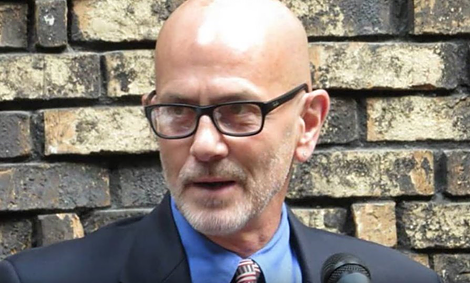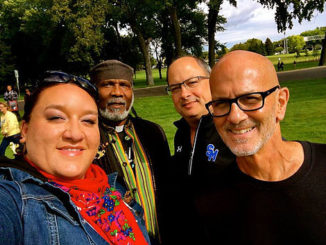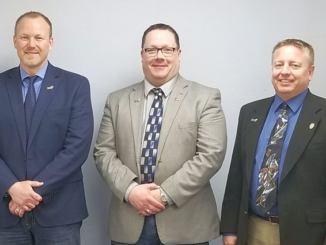
There’s an entire section of the North Dakota Century Code devoted to something known in political and legal circles as “Corrupt Practices”. Chapter 16.1-10 spells out all the specifics in regards to the law. And while there’s many reasons for such legalese, one of them is to guard against the “use of state services or property or the services or property of a political subdivision of the state for political purposes.”
A violation of the state’s Corrupt Practices Law was recently posted on the City of Bismarck’s Facebook page. You can see it below:

Seems pretty innocent, right? But state law prohibits such things. The City of Bismarck is not permitted to post material that promotes a candidate. And current Mayor Mike Seminary is a candidate for re-election. Not only is that evident by his “Mike Seminary for Mayor” page, but he officially announced his intentions on November 6th to seek office again.
The Century Code prohibits such things in these words:
“16.1-10-02. Use of state or political subdivision services or property for political purposes.
1. No person may use any property belonging to or leased by, or any service which is provided to or carried on by, either directly or by contract, the state or any agency, department, bureau, board, commission, or political subdivision thereof, for any political purpose.
2. The following definitions must be used for the purposes of this section:
a. ‘Political purpose’ means any activity undertaken in support of or in opposition to a statewide initiated or referred measure, a constitutional amendment or measure, a political subdivision ballot measure, or the election or nomination of a candidate to public office and includes using ‘vote for’, ‘oppose’, or any similar support or opposition language in any advertisement whether the activity is undertaken by a candidate, a political committee, a political party, or any person. In the period thirty days before a primary election and sixty days before a special or general election, ‘political purpose’ also means any activity in which a candidate’s name, office, district, or any term meaning the same as ‘incumbent’ or ‘challenger’ is used in support of or in opposition to the election or nomination of a candidate to public office. The term does not include activities undertaken in the performance of public office or a position taken in any bona fide news story, commentary, or editorial. Factual information may be presented regarding a ballot question solely for the purpose of educating voters if the information does not advocate for or against or otherwise reflect a position on the adoption or rejection of the ballot question.” (Emphasis Added)
Lending credibility to what I’m telling you is the fact that the aforementioned post was later deleted. But as you can see, not before evidence of it was captured.
While I recognize that the law specifically says it “does not include activities undertaken in the performance of public office” , the fact remains that Mayor Mike Seminary was obviously using the “DisruptWell Summit” as a means of promoting his candidacy for re-election. After all, he proclaimed the summit’s “enormous success” on his campaign page– a post which the City of Bismarck shared.
Interestingly enough, this isn’t the first time the city has done this. Back in April, they shared another post from Seminary’s campaign page:

Without question, there will be some that don’t find this problematic at all. But think of this… a city employee is accessing the Mayor’s campaign page and is sharing posts that promote him on the city’s official Facebook page.
In reality, candidate Mike Seminary was getting social media plugs from the City of Bismarck at the expense of some who don’t even support him. Is that an appropriate use of city resources?
But is this even really that surprising? Not really. After all, it was the city who made sure that the efforts to recall Mayor Mike Seminary earlier this year never came to fruition. A sad series of events that caused me to write about the apparent corruption that came out of that situation . One of the most despicable things to come out of the recall debacle was in relation to the treatment of some of Bismarck’s Police Officers. On May 11th of this year, the Say Anything Blog published an article that pointed out that there were officers from the Bismarck Police Department that signed the recall petition.
Just four days after the Say Anything article, City Administrator Keith Hunke wrote a letter to the Bureau of Criminal Investigation requesting interviews of the Bismarck Police Department employees that signed the petition.
Whatever the intentions may have been, investigating officers for signing a recall petition does not reflect well upon the city. Think of it… they were singled out in an investigation just days after it is publicly revealed that they had signed the petition to oust the Mayor. Coincidence? I don’t think so.
Stifling dissent is nothing new for the City of Bismarck, nor is it for Mayor Mike Seminary. I have had multiple reports of people being blocked from Seminary’s social media pages. Here’s one example that was sent to me:  You may be interested to know that back in July of this year a federal court ruled that public officials cannot block social media users because of criticism . That ruling came as the result of a lawsuit in Virginia where a public official banned someone from their Facebook page. Judge James C. Cacheris said that prohibiting participation in the online forum of a public official was “a cardinal sin under the First Amendment”.
You may be interested to know that back in July of this year a federal court ruled that public officials cannot block social media users because of criticism . That ruling came as the result of a lawsuit in Virginia where a public official banned someone from their Facebook page. Judge James C. Cacheris said that prohibiting participation in the online forum of a public official was “a cardinal sin under the First Amendment”.
Questions arise in regards to this issue when we consider private social media accounts versus government accounts. For example, is Mike Seminary’s personal Facebook or Twitter page subject to the same expectation of not blocking users as his campaign page would be? Consider this explanation:
“…courts must begin by asking which role a public official embodies on a given social media account: that of a private speaker or a government actor. If the answer is “private speaker,” [they] can limit [their] audience and curate the messages on the page, just like any other member of the public. But if the answer is “government actor,” the First Amendment dictates that [they] can’t prohibit access to [their] social media in three specific circumstances.
“First, once [they] intentionally open up [their] social media for public conversation, [they] can’t stop people from joining in because of the views they express on the topics at hand. Second, if [they] generally allow individuals to ask for government services through [their] social media account, [they] can’t block critical voices from doing so. And, finally, if [they] use [their] account to publicly share government information, [they] can’t prevent people from actually being able to see [their] posts because of their viewpoints.”
There is absolutely no doubt that Seminary utilizes all his social media pages to “publicly share government information”. And the fact that he can block users means that he can control the narrative of what he posts. Such actions not only hinder transparency, but they stifle dissent as well.
Is this really the type of government officials the citizens of Bismarck want?
Sources:
1. http://www.legis.nd.gov/cencode/t16-1c10.pdf
2. http://www.kfyrtv.com/content/news/Bismarck-Mayor-Mike-Seminary-announces-bid-for-re-election-in-2018-455723603.html 3. https://disruptwell.com/
4. https://theminutemanblog.com/single-post/2017/05/18/Mayoral-Recall-Did-the-City-of-Bismarck-Just-Subject-Itself-to-a-Lawsuit 5. https://theminutemanblog.com/single-post/2017/05/23/Continuing-Saga-Does-Bismarck-Mayoral-Recall-Reveal-Corruption 6. http://www.sayanythingblog.com/entry/signed-petition-recall-bismarck-mayor-mike-seminary-may-get-visit-cop/ 7. http://www.slate.com/blogs/future_tense/2017/07/28/federal_court_rules_public_officials_cannot_block_social_media_users.html 8. https://www.aclu.org/blog/free-speech/internet-speech/can-government-official-block-you-twitter





